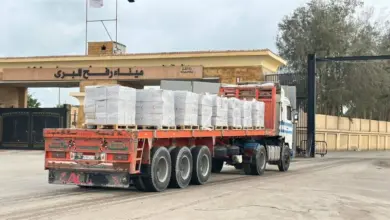Around 1300 activists from more than 40 countries who came to Cairo for the Gaza Freedom March (GFM) are now heading home after a week-long wave of demonstrations around the Egyptian capital.
GFM activists were openly frustrated at being prevented from marching into the besieged Gaza Strip to deliver humanitarian aid and show solidarity. Activists had spent months planning for the march. Some activists and organizers have expressed their intention to return to Egypt for a similar solidarity march to Gaza within months.
“I certainly hope to return to Egypt in the future," Ann Wright, the march’s chief organizer, told Al-Masry Al-Youm. "There will be another delegation arriving in six months, delegations to visit Egypt on transit to Gaza and return to their countries. We hope to bring back the message of the siege to our governments, so that they will act in lifting it.”
"It was a good opportunity for us to get together. We managed to organize demonstrations, non-violent protests outside embassies. We made a statement that Egypt and Israel are not cooperating in ending the siege. What we did here in Cairo was a great success,” Wright added.
During their time in Cairo GFM activists blocked streets, protested outside the Israeli Embassy, organized a sit-in and a sleep-in outside their respective embassies, climbed up pyramids and unfurled Palestinian flags along with Gaza-solidarity banners, and protested on the streets of Cairo. Eight activists even resorted to hunger strikes.
The GFM activists converged on Cairo on 27 December, intending for Egypt to be only a transit station, despite the Egyptian Foreign Ministry’s 21 December statement rejecting their requests to march through the Rafah border and into Gaza due to the "sensitive situation" there.
"We were in contact with the Foreign Ministry seven months before our arrival,” said Ehab Lotayef, one of the chief GFM organizers. Lotayef expressed his surprise at “the sudden decision to ban the march, less than one week before its scheduled date of commencement.”
On 29 December the Foreign Ministry agreed to allow 100 of the GFM activists into Gaza to deliver their humanitarian aid. Hundreds of GFM activists demonstrated against the compromise at the Journalists’ Syndicate that same day, chanting “to Gaza we will march.” The Canadian delegation attended the protest with a banner that read, “All 1300 of us on the march or NO ONE.”
At the end of the day the Egyptian government had its way. Only 92 activists are reported to have entered.
"It is certainly frustrating not being able to get to Gaza, that was our purpose and our goal, but our time in Egypt was useful, nonetheless," said Wright. "While those who were able to get in came back with remarkable stories of suffering and survival in Gaza.”
On 1 January the GFM issued a statement that they called the Cairo Declaration. The declaration calls for a boycott, divestment, and sanctions campaign against Israel to force the country to comply with international law, a movement similar to the one that pressured apartheid-era South Africa. The declaration also calls for “the prosecution of Israeli government war criminals.”
Coordination between the international and Egyptian activists was minimal, and security forces generally kept passersby from joining street protests.
The presence of a handful of Israeli peace activists among the marchers also kept Egyptian opposition elements from coordinating. “We–as leftists, Arab nationalists, or Islamists–cannot partake in a march involving Israelis, even if they are left radicals,” an Egyptian leftist told a French delegation during a discussion group. "You can coordinate with Israelis as much as you like in France, but if you want us to cooperate here in Egypt then you must not work with Israelis."
Not everyone was happy with how the march turned out. An activist from San Fransisco who identified himself as Jeff said, “I heard about this march back home through [the American anti-war group] Code Pink. I came along with them but I’ve been seriously let down by their poor organization and planning.”
"This is my first time in Egypt," Jeff said. "I was not aware that this country was really like. The police are everywhere.” He added, “I’m feeling frustrated with Code Pink, but I’m furious with what the Egyptian and Israeli governments are doing to Gaza.”
On 1 January, some 200 demonstrators protested against the siege of Gaza outside the Egyptian Embassy, whiled dozens demonstrated outside the Egyptian Embassy in Amman on 3 January. These demonstrators pointed to Egypt’s complicity in the siege on Gaza.
Egypt’s Rafah border with Gaza will be opened from 3-6 January, according to media reports. The Viva Palestina Convoy, an aid and solidarity convoy consisting of more than 200 trucks of humanitarian aid and with 450 activists, is due to arrive at theAl-Arish port on 4 January. Last week Egyptian government authorities demanded the convoy be rerouted from Jordan to Syria in order to enter Egypt from the Mediterranean rather than the Red Sea Port of Nuweiba.




